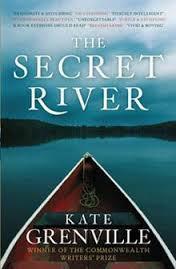 This book brought back lots of memories of my trip a few years ago to Australia. We learned a lot about the aboriginal population and how they suffered when the British settled there. We also learned a lot about their way of life, including hunting and agricultural practices.
This book brought back lots of memories of my trip a few years ago to Australia. We learned a lot about the aboriginal population and how they suffered when the British settled there. We also learned a lot about their way of life, including hunting and agricultural practices.
Kate Grenville’s award winning book describes an English family transported to New South Wales (Sydney and its surrounding area) after William is convicted of theft and sentenced to death or indentured servitude in Australia.
Australia is a gorgeous country today and I can only imagine how rich and beautiful it must have been in the 1700’s. While it takes William and his wife some time to adjust to the dramatic change in climate and culture, in many ways the deportation is a gift rather than a sentence.
As William attempts to work his way out of servitude, he falls in love with a parcel of land that’s in pretty unsettled territory. Land is there for the taking at this time. But there are large numbers of aboriginal people living there, and of course the settlers are wary of them (and vice versa).
Grenville describes the struggle of this one family in a way that is simultaneously understandable and horrifying. Most of the settlers don’t even see the aboriginal people as human, and those who try to establish relationships with them are viewed with disgust. Grenville really shows us the push and pull between these two groups. When the aboriginal people keep to themselves, they are seen as similar to animals. And when they occasionally stand up for themselves, they are seen as the enemy and treated savagely.
And yet, William sees them as human, and also sees that at times they are much smarter about the land than he is. For example, they know about setting strategic fires and the best ways to hunt kangaroo without reducing the kangaroo population (things we learned about when we traveled to Uluru). Plus, one of his children befriends the aboriginal children, so it becomes harder and harder to see them as “other.”
When my husband and I traveled to Australia, we were a bit overwhelmed by the Australians’ apologizing again and again for their treatment of the aboriginal people. Please understand — I’m not saying they don’t have reason to apologize. They do, and we do in the U.S. as well. It’s just that at times it felt like apologies without any solutions. The aboriginal people can’t return to a time before the British took over the country, and yet they are not integrated into modern life either. Like our Native American population, they suffer from serious health issues like alcoholism and the disruption of their culture and family life.
This book also felt overwhelming, and intentionally so. This is not an easy subject and not an easy book to read. But I appreciated Grenville’s nuanced portrayal of the settlers, some of whom tried hard to be friends with the aboriginal people and some who treated them horrifically. And sadly, we see how even a well-intentioned person might have been pulled in the direction of terrible acts.
At times this book plods a bit, but ultimately it’s a nuanced but devastating look at a collision of cultures. You’ll be rooting for William to rise above his neighbors and be the better person. And that’s what makes this book so compelling.
Also interesting in this book was the tension between William and his wife. It’s maddening at times because they are clearly at odds, and despite her very strong wishes William has control of their lives. He can be pretty thoughtless, making promises he’ll probably never keep. I kept thinking, what’s she going to do, leave? Australia in the 1700’s is like a Wild West town, I can’t imagine how a woman leaves her husband in that scenario, especially as neither of them has money, influence, or family.
This is the kind of book you’ll be thinking about long after you read it.
Note: I read this book for the Around the World in 12 Books Challenge.

